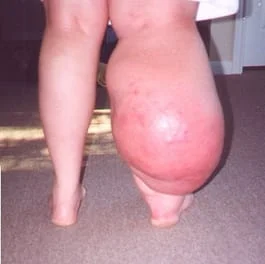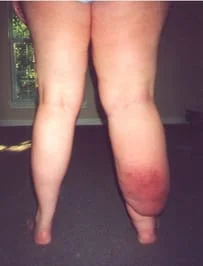Lymphedema is an accumulation of protein rich fluid in the interstitium of the skin caused by an insufficiency in the lymph vessel system.This condition occurs when there his impairment to normal lymphatic flow. It can be caused by a deficiency of lymph vessels or nodes during fetal development and this type is called Primary Lymphedema. It can also be the result of an external cause such as the removal of lymph nodes, radiation, obstruction, trauma or injury to the lymph vessels. It is then known as Secondary Lymphedema. For secondary lymphedema after breast cancer surgery, it is estimated that between 6 and 49% of women will develop this condition (Armer J. et. al. 2005).
Secondary Lymphedema


Before After (5 weeks after treatment)
What causes lymphedema?
Lymphedema is prevalent throughout the world. The major cause in developed countries is due the damage caused to the lymph system incidental to cancer surgery and / or radiation, or by the malignant disease itself (Keeley, V. in Lymphoedema ed Twycross et al. Radcliffe. 2000). In underdeveloped, tropical countries, the major cause is a parasitic infestation (filariasis) from a nematode worm which is transmitted by mosquitoes. It is estimated that 750 million people suffer from filariasis. Lymphedema can develop due to an allergic reaction to filarial antigens (Weissleder et. al. Lymphedema Diagnosis and Therapy. Viavital, 2008).
How does lymphedema arise?
Damage, blockage or absence of lymph vessels leads to a reduced transport capacity of the lymph vessel system. Fluid and proteins can then not be removed properly and they start to accumulate in the tissues especially in the skin where many lymph vessels are found. Accumulating proteins exert an attraction force for water (colloid osmotic pressure) and more water is attracted from the blood stream into the tissues. At the same time, less fluid is able to leave the tissues because of the problems in the lymph vessel system. The net result is that the tissue starts to swell.
When does the swelling occur?
Lymphedema can occur at any time. Some babies are born with this condition if they do not have a sufficiently intact lymph system (Primary). Adolescents may develop lymphedema in teenage years (Primary). Adults often develop lymphedema after cancer surgery and / or radiation (Secondary). In this case the lymphedema can appear months or years after the surgery and/or radiation or may never manifest. However all patients who have had damaged or deficient lymph systems are at risk of developing lymphedema (Foeldi E, Foeldi M, Kubik, S. Textbook of Lymphology. München, Germany: Urban and Fischer, 2003).
How can lymphedema be treated?
Combined Decongestive Therapy (CDT) is a successful method of treating lymphedema. It must be adapted to the specific requirements of each patient and treatment should only be attempted by a fully qualified therapist who understands not only the pathology but also the most appropriate treatment. 75% of CDT failure is caused by incorrect therapy (Weissleder et al). Other adjunct therapies may be used in combination with CDT, such as Pneumatic Compression in some cases. Medication is generally not prescribed for lymphedema unless there are other co-morbidities necessitating their use. Patients should consult with their physician regarding the use of medications for lymphedema. Surgical procedures have had limited success in treating lymphedema.
Lymphedema is a chronic condition that can be successfully managed with on-going maintenance CDT. At present there is no cure for lymphedema.
Combined Decongestive Therapy (CDT)
CDT is a combination of the Dr. Vodder method of Manual Lymph Drainage, remedial exercise therapy, compression bandaging (or compression garments in the maintenance phase) and therapeutic skin care. It may also include breathing and aquatic exercises, adjunct therapies such as dietary measures.
Can lymphedema occur with other diseases?
Lymphedema can be associated with conditions such as chronic venous insufficiency, resulting in phlebo-lymphedema. It can also be associated with impaired fat deposition as in lipo-lymphedema.
If you suffer from Lymphedema and Interested in this treatment plan. Contact us today and schedule an appointment to discuss how we can help you.